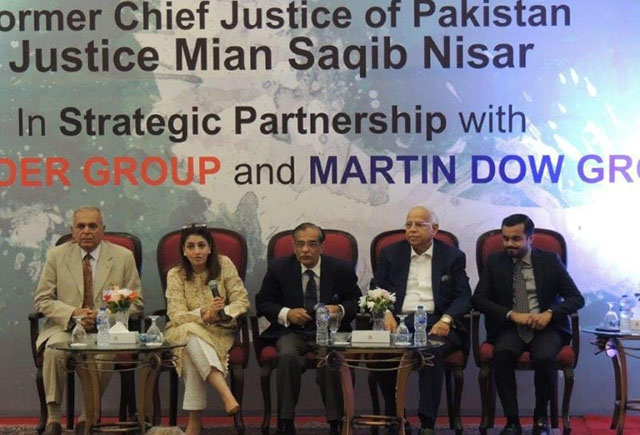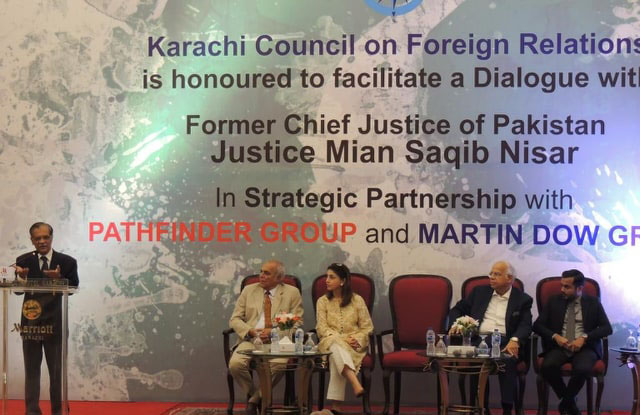To highlight the connecting of the global with the local and therewith Pakistani’s problems and solutions in the light of global developments, the Karachi Council on Foreign Relations (KCFR) held an event in Karachi on Feb 24, 2019 with the former Chief Justice Mian Saqib Nisar as the Chief Guest. This dialogue was facilitated in strategic partnership with Pathfinder Group and Martin Dow Group. KCFR is attempting to contribute to the efforts that are underway in Pakistani society to bring about change in the lives of the people by reforming the institutions of state and society. The Sunday session of the KCFR was a follow-up organized by Pathfinder Group and Martin Dow Group, which had organized the presentation of Pakistan at the WEF in Davos. In this way the global discussions that had taken place in Davos were not only publicized in Pakistan but how adaption of the global deliberations to our Pakistani situation was attempted and achieved. By organizing this event KCFR successfully connected the global with the local. It is hoped that in this way the needed broadening of public interest in the problems that stir Pakistan today has been initiated.
The organizers challenged the Karachi public by making it an early morning event on a Sunday, recovering from the stress of the previous week Karachi society’s thinking members are not known to be early risers. The person of the chief guest did attract as many as an estimated 220 people (in contrast to the 100 catered for) to listen the thoughts and deliberations of Mian sahib.
Dr. Huma Baqai, Secretary General KCFR and a member of the PM’s Advisory Council on Foreign Affairs, in her opening remarks connected the event with the deliberations that were held at the World Economic Forum (WEF) in Davos last month where discussions focussed at the problems caused by global environmental degradation resulting in climate change and global socio-economic degradation resulting in a growth of world-wide poverty. She reminded the audience that the message of Davos is that our current system of capitalism that is based on maximization of profit has to be changed and that capitalism with a conscience was the need of the day.
Mian Saqib Nisar seamlessly connected to her remarks by speaking how to deal with the burning problems of Pakistan. Interestingly, he started his presentation by reciting from Sura-Ar-Rahman, to quote, then which of your Lord’s blessings would you (both) deny. It is one of the most beautiful Surah in the Quran where God reminds us of the many blessings HE has bestowed upon us and calls upon us to be grateful and cherish what God has given, among them water and fruit for nourishment. Mian Sahib reminded the audience that Pakistan did not come easily but that many people worked for it tirelessly. He said that a state was a great gift from Allah, a blessing for a nation. We did not inherit Pakistan for free nor did we receive it as charity. Quaid-e-Azam’s struggle, Allama Iqbal ideas and Baba Bhullay Shah’s vision as well as sacrifices of countless people are involved in its making, he said, adding that people who came to Pakistan after partition used to cry out of happiness and relief, but now the people seemed to be losing their patriotism which was an alarming sign. He said that the state of Pakistan even after more than seventy years of its creation was weak and its institutions did not fulfil the task for which they were created. He emphasized that a state any state- could not be ruled without the consent of the people. That has not been the case in Pakistan where a tiny ruling elite has used it as a means for staying in power and enriching themselves. Thus, a main task that has to be tackled to make Pakistan strong by involving a much larger number of people in the running of the state. In order to achieve this education is needed. Only when people know about their rights and their obligations they can fruitfully contribute to a smooth running of the state and its institutions.

Mian Sahib was eloquent about the rule of law and the judiciary. But laws are not respected by all and for justice to be served to the people accountability across the board is a necessity. Only if that is achieved justice can be delivered. It is pertinent to remark at this point Mian Sahib noted that his successor as the new CJ of Pakistan has already made an important addition by highlighting the need to fight perjury in Pakistani courts. The former CJ mentioned two more important issues, that the water problem and the population growth problem are interconnected. There is a water scarcity in Pakistan and the problem of water storage, distribution and management has to be solved on a priority basis. His contribution was the initiating of a fund for the construction of dams. Another major problem is water purity. Unsafe drinking water is a severe public health issue and doctors say that half of all diseases in Pakistan could be avoided if just all people had access to clean drinking water. A fast-growing population exerts pressure on natural resources like water. He reminded the audience that population control and disparity of resources in relation to population will require significant provisions and planning at current stage in order to preserve the future of the country. He stated that if the population not brought under control the population of 220 million would reach 390 million in a span of 30 years.
During the Q & A Session, Mian Sahib was eloquent answering questions about the topics very close to his heart, water shortages and water purity in Pakistan, the former CJ stressed that without awareness on these issues otherwise the future would hold dire consequences. He again emphasized the extremely vital nature of the Diamer-Bhasha Dam as a lifeline for the country, without water Pakistan could well turn into desert. Touching upon the issue of Right to Life and the conditions that must be brought about for the poor to face under bad governance, he was pained that basic elements of life are not provided to all citizens, particularly those on the lower end of the economic scale. He said the core element of his mission and the mission for Pakistan is to instill the value of each fundamental human right into the system of governance. He touched upon population control, disparity of resources in relation to population, significance of provincial autonomy, the 18th Amendment, the jirga system, etc. Rejecting rumours that he planned to enter politics, he said he had taken steps to install a “free legal aid” setup for those who lack resources. This in essence sums up this truly great Pakistani, service to humanity over self.




